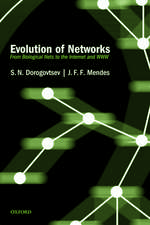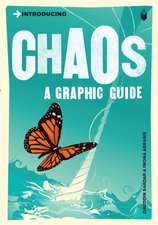Guided Self-Organization: Inception: Emergence, Complexity and Computation, cartea 9
Editat de Mikhail Prokopenkoen Limba Engleză Hardback – 9 ian 2014
This book presents different approaches to resolving this paradox. In doing so, the presented studies address a broad range of phenomena, ranging from autopoietic systems to morphological computation, and from small-world networks to information cascades in swarms. A large variety of methods is employed, from spontaneous symmetry breaking to information dynamics to evolutionary algorithms, creating a rich spectrum reflecting this emerging field.
Demonstrating several foundational theories and frameworks, as well as innovative practical implementations, Guided Self-Organisation: Inception, will be an invaluable tool for advanced students and researchers in a multiplicity of fields across computer science, physics and biology, including information theory, robotics, dynamical systems, graph theory, artificial life, multi-agent systems, theory of computation and machine learning.
| Toate formatele și edițiile | Preț | Express |
|---|---|---|
| Paperback (1) | 954.14 lei 6-8 săpt. | |
| Springer Berlin, Heidelberg – 27 sep 2016 | 954.14 lei 6-8 săpt. | |
| Hardback (1) | 958.38 lei 6-8 săpt. | |
| Springer Berlin, Heidelberg – 9 ian 2014 | 958.38 lei 6-8 săpt. |
Din seria Emergence, Complexity and Computation
- 8%
 Preț: 397.83 lei
Preț: 397.83 lei - 18%
 Preț: 1132.65 lei
Preț: 1132.65 lei - 18%
 Preț: 946.72 lei
Preț: 946.72 lei - 20%
 Preț: 651.75 lei
Preț: 651.75 lei - 20%
 Preț: 570.97 lei
Preț: 570.97 lei - 15%
 Preț: 653.33 lei
Preț: 653.33 lei - 15%
 Preț: 648.24 lei
Preț: 648.24 lei - 15%
 Preț: 651.19 lei
Preț: 651.19 lei - 20%
 Preț: 940.98 lei
Preț: 940.98 lei -
 Preț: 392.37 lei
Preț: 392.37 lei - 15%
 Preț: 647.59 lei
Preț: 647.59 lei - 15%
 Preț: 641.71 lei
Preț: 641.71 lei - 15%
 Preț: 645.28 lei
Preț: 645.28 lei - 15%
 Preț: 649.06 lei
Preț: 649.06 lei - 18%
 Preț: 1415.22 lei
Preț: 1415.22 lei - 20%
 Preț: 1304.44 lei
Preț: 1304.44 lei - 20%
 Preț: 1296.18 lei
Preț: 1296.18 lei - 20%
 Preț: 655.35 lei
Preț: 655.35 lei - 15%
 Preț: 648.56 lei
Preț: 648.56 lei - 18%
 Preț: 953.82 lei
Preț: 953.82 lei - 20%
 Preț: 657.02 lei
Preț: 657.02 lei - 18%
 Preț: 1117.03 lei
Preț: 1117.03 lei - 20%
 Preț: 992.26 lei
Preț: 992.26 lei - 15%
 Preț: 656.74 lei
Preț: 656.74 lei - 20%
 Preț: 649.60 lei
Preț: 649.60 lei - 15%
 Preț: 654.43 lei
Preț: 654.43 lei - 20%
 Preț: 661.14 lei
Preț: 661.14 lei - 20%
 Preț: 645.47 lei
Preț: 645.47 lei - 20%
 Preț: 658.19 lei
Preț: 658.19 lei - 20%
 Preț: 644.15 lei
Preț: 644.15 lei - 18%
 Preț: 880.77 lei
Preț: 880.77 lei - 20%
 Preț: 1455.75 lei
Preț: 1455.75 lei - 20%
 Preț: 1158.26 lei
Preț: 1158.26 lei
Preț: 958.38 lei
Preț vechi: 1168.76 lei
-18% Nou
Puncte Express: 1438
Preț estimativ în valută:
183.41€ • 190.77$ • 151.41£
183.41€ • 190.77$ • 151.41£
Carte tipărită la comandă
Livrare economică 14-28 aprilie
Preluare comenzi: 021 569.72.76
Specificații
ISBN-13: 9783642537332
ISBN-10: 3642537332
Pagini: 500
Ilustrații: XXII, 475 p. 172 illus., 54 illus. in color.
Dimensiuni: 155 x 235 x 32 mm
Greutate: 0.82 kg
Ediția:2014
Editura: Springer Berlin, Heidelberg
Colecția Springer
Seria Emergence, Complexity and Computation
Locul publicării:Berlin, Heidelberg, Germany
ISBN-10: 3642537332
Pagini: 500
Ilustrații: XXII, 475 p. 172 illus., 54 illus. in color.
Dimensiuni: 155 x 235 x 32 mm
Greutate: 0.82 kg
Ediția:2014
Editura: Springer Berlin, Heidelberg
Colecția Springer
Seria Emergence, Complexity and Computation
Locul publicării:Berlin, Heidelberg, Germany
Public țintă
ResearchCuprins
Foundational frameworks.-
Coordinated behaviour and learning within an embodied agent.-
Swarms and networks of agents.
Swarms and networks of agents.
Textul de pe ultima copertă
Is it possible to guide the process of self-organisation towards specific patterns and outcomes? Wouldn’t this be self-contradictory? After all, a self-organising process assumes a transition into a more organised form, or towards a more structured functionality, in the absence of centralised control. Then how can we place the guiding elements so that they do not override rich choices potentially discoverable by an uncontrolled process?
This book presents different approaches to resolving this paradox. In doing so, the presented studies address a broad range of phenomena, ranging from autopoietic systems to morphological computation, and from small-world networks to information cascades in swarms. A large variety of methods is employed, from spontaneous symmetry breaking to information dynamics to evolutionary algorithms, creating a rich spectrum reflecting this emerging field.
Demonstrating several foundational theories and frameworks, as well as innovative practical implementations, Guided Self-Organisation: Inception, will be an invaluable tool for advanced students and researchers in a multiplicity of fields across computer science, physics and biology, including information theory, robotics, dynamical systems, graph theory, artificial life, multi-agent systems, theory of computation and machine learning.
This book presents different approaches to resolving this paradox. In doing so, the presented studies address a broad range of phenomena, ranging from autopoietic systems to morphological computation, and from small-world networks to information cascades in swarms. A large variety of methods is employed, from spontaneous symmetry breaking to information dynamics to evolutionary algorithms, creating a rich spectrum reflecting this emerging field.
Demonstrating several foundational theories and frameworks, as well as innovative practical implementations, Guided Self-Organisation: Inception, will be an invaluable tool for advanced students and researchers in a multiplicity of fields across computer science, physics and biology, including information theory, robotics, dynamical systems, graph theory, artificial life, multi-agent systems, theory of computation and machine learning.
Caracteristici
Captures the most representative approaches of the emerging field of guided self-organization, and covers its development over the last few years Includes in-depth reviews and descriptions of future research in the most important guided self-organization areas Offers a comprehensive perspective on guided self-organization at the early years of this emerging field Edited and written by leading experts in the field














